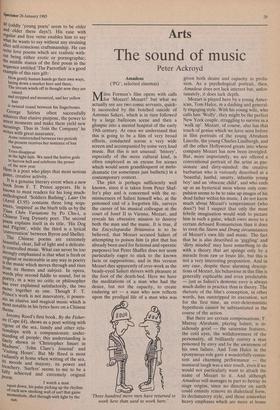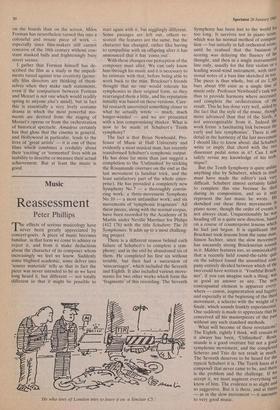Arts
The sound of music
Peter Ackroyd
Amadeus ('PG', selected cinemas)
Milos Forman's film opens with calls for 'Mozart! Mozart!' but what we actually see are two comic servants, quick- ly succeeded by the botched suicide of Antonio Salieri, which is in turn followed by a large ballroom scene and then a glimpse into a mental hospital of the early 19th century. At once we understand that this is going to be a film of very broad effects, conducted across a very wide screen and accompanied by some very loud music. But this is not unusual: 'history', especially of the more cultural kind, is often employed as an excuse for scenes which would seem grandiloquent or melo- dramatic (or sometimes just bathetic) in a contemporary context.
The plot is perhaps sufficiently well known, since it is taken from Peter Shaf- fer's play and is concerned with the re- miniscences of Salieri himself who, at the poisoned end of a forgotten life, surveys the career of his musical colleague at the court of Josef II in Vienna, Mozart, and reveals his obsessive mission to destroy both the man and the music. It is true, if the Encyclopaedia Britannica is to be believed, that Mozart accused Salieri of attempting to poison him (a plot that has already been used for fictional and operatic purposes) but Peter Shaffer does not seem particularly eager to stick to the known facts or suppositions, and in this version Mozart dies apparently of over-work as the beady-eyed Salieri shivers with pleasure at the foot of the death-bed. Here we have the meditations of a man who had the desire, but not the capacity, to create enduring art — a man who now reflects upon the prodigal life of a man who was 'Three hundred more men have returned to work here than used to work here.' given both desire and capacity in profu- sion. As a psychological portrait, then, Amadeus does not lack interest but, unfor- tunately, it does lack depth.
Mozart is played here by a young Amer- ican, Tom Hulce, in a dashing and general- ly engaging style. With his young wife, who calls him `Wolfy', they might be the perfect New York couple, struggling to survive in a `walk up'. Mozart, of course, also has that touch of genius which we have seen before in film portraits of the young Abraham Lincoln, the young Charles Lindbergh, and all the other Hollywood greats into whose company Mozart has now been inveigled. But, more importantly, we are offered a conventional portrait of the artist as pas- sionate and dirty-minded: the creative barbarian who is variously described as a 'boastful, lustful, smutty, infantile young boy' and an 'obscene child', and who ends up as an hysterical mess whose only com- pulsion seems to be to raise up images of his dead father within his music. I do not know much about Mozart's temperament (who does?) but I suspect that only the most febrile imagination would wish to picture him in such a guise, which owes more to a certain debased Romanticism than it does to even the Sturm and Drang circumstances of Mozart's own life and music. The fact that he is also described as 'giggling' and `dirty minded' may have something to do with a theory that art springs only by a miracle from raw or brute life, but this is not a very interesting proposition. And in any case, despite these alarming descrip- tions of Mozart, his behaviour in this film is generally explicable and even predictable — just as Salieri's demonic envy is always much duller in practice than in theory. The rhetoric of the film's conception, in other words, has outstripped its execution; not for the first time, an over-deterministic hypothesis cannot be substantiated in the course of the action.
But there are certain compensations; F. Murray Abraham, playing Salieri, is in- sidiously good — the saturnine features, the cold eyes, the withdrawnness of the personality, all brilliantly convey a man poisoned by envy and by the awareness of his own failure. And Tom Hulce in the eponymous role gave a wonderfully consis- tent and charming performance — the maniacal laugh was a nice touch, even if we would not particularly want to attach the name of Mozart to it. And although Amadeus still manages in part to betray its stage origins, since no director on earth could entirely remove its dialectical form, its declamatory style, and those somewhat heavy emphases which are more at home on the boards than on the screen, Milos Forman has nevertheless turned this into a colourful and ornate piece of work especially since film-makers still cannot conceive of the 18th century without con- stant masked balls and frighteningly busy street scenes.
I gather that Forman himself has de- scribed the film as a study in the impedi- ments raised against true creativity (gener- ally film directors are thinking of them- selves when they make such statements, even if the comparison between Forman and Mozart is not one which would readily spring to anyone else's mind), but in fact this is essentially a very lively costume drama in which the most powerful mo- ments are derived from the staging of Mozart's operas or from the orchestration of historical spectacle. Amadeus certainly has that gloss that the cinema in general, and Hollywood in particular, lends to the lives of 'great artists' — it is one of these films which combines a credulity about their 'exciting' or 'tormented' lives with an inability to describe or measure their actual achievement. But at least the music is good.











































 Previous page
Previous page